Different Eyes and Ears
America is compelling. She pulls you, shapes you, and influences you. In thinking of all the ways she has changed me – mundane ways like learning to drive on the right and turning the light switch up for on, to profound ways like freedom of speech and having so much artistic excellence to choose from – I have been considering the way she has made a mark on immigrant composers, and the mark they have left on her.
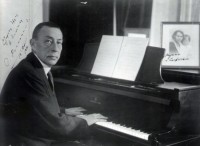
Sergei Rachmaninov
Born April 1, 1873 in the Russian Empire
Emigrated 1918
Naturalized citizen 1943
Died March 28, 1943 in New York
Sergei Rachmaninov was born into an aristocratic Russian family, and his life was turned around forever with the Russian Revolution in 1917. At 44, carrying just a few of his manuscripts, he and his family quietly left Russia, never to return, and came to the States by way of Scandinavia. He made a living by pursuing a punishing schedule as a concert pianist, which cut back dramatically on his composing. But his touring schedule wasn’t the only reason. He was desperately homesick; it was as if he had left his inspiration behind in Russia. When the Rachmaninovs bought a home in America, they recreated a Russian ambience, with Russian friends and customs. Only when he built a summer villa in Switzerland, which reminded him of his family estate in Russia, was he able to begin composing again. Even so, he completed just six more substantial compositions, including one of his most famous: Rhapsody on a Theme of Paganini, which had its premiere at the Lyric Opera House in Baltimore, on November 7, 1934. Of all the composers who became naturalized American citizens, Rachmaninov was possibly the one who found it the most difficult to assimilate.
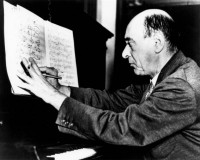
Arnold Schoenberg
Born September 13, 1874 in Vienna
Emigrated 1934
Naturalized citizen 1941
Died 13 July, 1951 in Los Angeles
Arnold Schönberg, the leading figure of the Second Viennese School and of atonal music, was vacationing in France when he received word that it would be dangerous for him – as a Jew – to return to Austria because of the rise of Nazi anti-semitism. He moved to the States, deeply unsettled by his forced relocation. He had hoped, at first, to be able to emigrate to Britain, and he later applied for positions in Australia and New Zealand. Nevertheless, he was offered teaching positions in California, bought a Spanish Revival house there, and began to host parties whose guests included luminaries from the musical and movie worlds. His near neighbor was Shirley Temple, and his tennis partner was George Gershwin. Gradually, he began to adjust to his new life, and he changed the spelling of his name from Schönberg to Schoenberg in deference to the American way. During his American years, he composed works like his Violin and Piano Concertos, and a memorial to the victims of the Holocaust. He even, strangely enough, began to turn again to tonality towards the end of his life. It’s interesting to toy with the idea that his contact with America might have had something to do with that.
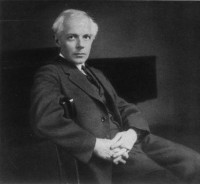
Béla Bartók
Born March 25, 1881 in Hungary
Emigrated 1940
Naturalized citizen 1945
Died September 26, 1945 in New York
Béla Bartók, one of the pioneering ethnomusicologists, was appalled when his native Hungary sided with Germany during World War II and, after sending his manuscripts ahead, he went into exile in the United States. Like Rachmaninov and Schoenberg, Bartok never felt fully at home in the U.S. For one thing, his compositions weren’t initially understood by the Americans. Shortly after his arrival, he began to suffer unexplained health problems, which were eventually diagnosed as leukemia. Ironically, it was as his health began to fail, that he found a new spurt of creative energy. Bartok’s earlier compositions had been strongly influenced by the field work he had done recording authentic, unrefined Hungarian folk music. The works he wrote in America towards the end of his life – his Concerto for Orchestra, his Neoclassical 3rd Piano Concerto, and the first sketches for his Viola Concerto – suggest a change of direction from that earlier style of composition, as if his contact with America had mellowed his musical voice.
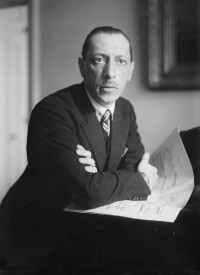
Igor Stravinsky
Born June 17, 1882 in a suburb of Saint Petersburg
Emigrated 1939
Naturalized citizen 1945
Died April 6, 1971 in New York
Igor Stravinsky was introduced to Europe through the overnight success of his ballet The Firebird for Diaghilev’s Ballets Russes in 1910, and he then divided his time between Switzerland, Paris, and Russia, until a combination of World War I and the Russian Revolution made it impossible for him to return to his native country. He would not go back again until the 1960s. During his Paris years, Stravinsky had made important American contacts, and he was invited to deliver the prestigious Norton Lectures at Harvard University in 1939. He moved to Hollywood, and after initially seeking out Russian emigres for companionship, settled into the cultural life in Los Angeles, mixing with the likes of the German conductor, Otto Klemperer; the Polish pianist, Arthur Rubinstein; the Russian choreographer, George Balanchine; the German writer, Thomas Mann; and British writers W. H. Auden, Christopher Isherwood, and Dylan Thomas. In the 1950s and 60s, Stravinsky experimented with serialism and the 12-tone technique pioneered by Schoenberg, but when he arrived in America, he was still composing in a Neo-classical style. His 1947 ballet, Orpheus, and his 1951 opera, The Rake’s Progress (to a libretto by W.H. Auden) come from this period. Stravinsky’s unique approach to rhythm (think of The Rite of Spring) influenced our own composers, like Aaron Copland, and his reputation was such that he was given a star on the Hollywood Walk of Fame and a posthumous Grammy Award for Lifetime Achievement.
There are so many composers who, for one reason or another, emigrated to the States – Paul Hindemtih, Ernst Bloch, Mario Castelnuovo-Tedesco, Ernö Dohnányi, Alexander von Zemlinsky, Percy Grainger, amongst others – but I’m going to close with just two more, one Viennese and one German, whose move to America profoundly changed the way they made music.
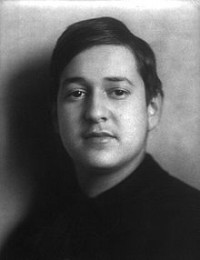
Erich Wolfgang Korngold
Born May 29, 1897 in Austria-Hungary
Emigrated 1938
Naturalized citizen 1943
Died November 29, 1957 in Los Angeles
The Viennese prodigy, Erich Wolfgang Korngold, praised by Gustav Mahler and Richard Strauss during his early years in Austria, became a pioneer of film music in Hollywood. It was Max Reinhardt, himself an Austrian-born transplant to America, who first invited Korngold to the States to adapt Mendelssohn’s score of A Midsummer Night’s Dream for a movie version. In 1938, Korngold was invited back to write the film score for The Adventures of Robin Hood. He not only won an Oscar for the score, he said the movie saved his life. While he was in California, the Anschluss – the annexation of Austria by Nazi Germany – took place, and being a Jew in his native country became dangerous. His approach to writing film scores had a profound affect on the industry in this country. He thought of each score as “opera without singing,” and composed it in such a way that it could stand on its own merit as a through-composed concert piece. Outstanding examples are The Private Lives of Elizabeth and Essex (1939) and The Sea Hawk (1940), both nominated for Academy Awards.
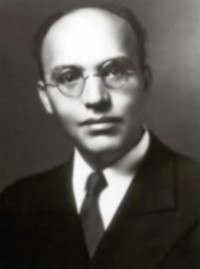
Kurt Weill
Born March 2, 1900, in the Jewish quarter in Dessau, Germany
Emigrated 1935
Naturalized citizen 1943
Died April 3, 1950, in New York City
The German composer, Kurt Weill, collaborated with Bertolt Brecht on The Threepenny Opera and other socially charged works in Berlin in the 1930s. As a Jew, he was targeted by the Nazis and, after completing his 2nd Symphony, his last purely orchestral work, he and his wife, Lotte Lenya, emigrated to New York by way of Paris and London. He made a complete break with his former composing style, studied American popular music, and began collaborating with librettists like Maxwell Anderson, Ira Gershwin, and Oscar Hammerstein on shows that were seminal in the development of American musicals. Mack the Knife, his most famous song from The Threepenny Opera, became an American jazz standard, and musicians ranging from Nina Simone and Ella Fitzgerald to David Bowie and Judy Collins have recorded the range of his songs.
At the swearing ceremony when I became a naturalized U.S. citizen, the judge encouraged us never to lose our connection to our native countries, even as we assimilated into the United States, because, he said, every immigrant adds another element to the diverse patchwork of this country. So it is that each one of these composers, while retaining the essence of their countries of origin, entered into a musical dialog with their adopted country, as if holding up a two-way mirror that allowed both them and America to experience musicality through different eyes and ears.





